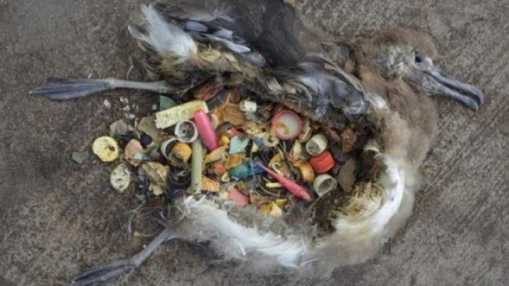After handing my toddler a stack of old cards to play with I discovered a small stash of iTUNEs gift cards. So I did what any normal person would do – I went in search of some good documentaries. I decided to watch A Plastic Ocean.
The documentary walks you through the origin and consequences of the accumulation of plastic waste in our waters. I thought the film was worth the watch, if a bit slow and disjointed to get going. A lot of numbers are thrown at you which I know won’t stick in people’s minds as much as other visuals. That being said I did like the film.
There were three features of the film that I really enjoyed.
First, the narrator/director seemed to stumble upon this environmental problem accidentally: he started out making a documentary about blue whales and found himself swimming in garbage during the filming. I think because of this perspective the film feels less preachy – something that is always a concern with environmental films.
I was also moved by the scenes where the film makers and scientists began dissecting dead animals they found on the shorelines. Birds and fish alike had died because their stomachs were literally FILLED with plastic pieces that they could not digest. It was something you could see with your own eyes as the animals were cut open.

Finally, near the end of the film we follow one of the activists as she talks to scientists studying the toxicology of plastics. She is carrying her newborn son the entire time and on the verge of tears discussing how potentially dangerous chemicals are leaching from plastic baby bottles. I have a toddler. This hit home in a very real way.
As always I would love to have seen more of a discussion on what the average person can do to solve the problem. The film highlights several groups that are finding better solutions to recycling the plastic, however, my stance is that we should always focus on not making the plastic in the first place. They mention the obvious “don’t use plastic bottles” and “demand better packaging from companies” but I always feel these are open ended suggestions as they in themselves are not very actionable. So I have included some of my own suggestions below that you might find more useful:
- Get your kids to bring their own reusable straw when eating out. Pick stainless steel over plastic ones.
- Use reusable produce bags instead of single-use plastic ones your find at the store. Obviously a bit more money then the free plastic bags but once bought they can be washed as reused. Zero more work. Pick 100% cotton to ensure they are biodegradable once worn out.
- Bring your own tupperware (ideally glass or stainless steel) when you eat out to bring your leftovers home in.
- Look for clothing made out of cotton, wool, silk, bamboo, Lyocell, hemp, soy, cashmere, linen, alpaca, and ingeo. Synthetic fabrics often have plastic in them.
- Buy food at bulk food stores (though see my rant about the Bulk Barn) to reduce packaging.
- Buy meat from a butcher and ask that it be wrapped in parchment/butcher paper. Stores just as well as being wrapped in plastic and the paper is biodegradable.
- Use this Abeego product instead of saran wrap to keep food in your fridge fresh.

Leave a comment